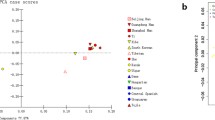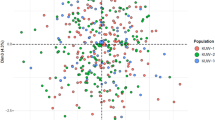Summary
Family studies were carried out in a population sample from north west Germany using 4 amplifiable VNTR polymorphic systems D1S80 (MCT118), ApoB, D17S30 (YNZ22) and COL2A1. Separation was carried out in polyacrylamide gels and visualised using silver staining. In family studies (n = 30) no evidence of new mutations was found. The population study of unrelated individuals (mothers and putative fathers) showed that all 4 systems were highly polymorphic and similar to other population studies. The combined exclusion chance was calculated to be approximately 99% and the combined discrimination index 1.5 · 10−4. The HardyWeinberg equilibrium was checked by forming groups of alleles and no significant deviations could be found in all systems.
Zusammenfassung
Untersucht wurden Familien einer nordwestdeutschen Bevölkerungsstichprobe mit 4 amplifizierbaren VNTR-Polymorphismen (MCT118, ApoB, YNZ22, COL2A1). Die Darstellung der Systeme erfolgte in Polyacrylamidgelen durch Silberfärbung. Es fand sich kein Hinweis auf Neumutationen. Anhand der typisierten Unverwandten (Mütter und Putativväter) konnten für jedes System Allelfrequenzen ermittelt werden, die im Vergleich zu anderen Bevölkerungsstichproben relativ gute Übereinstimmungen aufwiesen. Die Berechnung der kombinierten Ausschlußchance für die 4 Systeme führte zu einem Wert von etwa 99%. Der dazu korrespondierende Diskriminationsindex betrug 1,5 · 10−4. Zur Uberprüfung des Hardy-Weinberg-Gleichgewichts wurden Allelgruppen gebildet. Für alle 4 Systeme konnte das Hardy-Weinberg-Gleichgewicht nachgewiesen werden.
Similar content being viewed by others
References
Allen RC, Graves G, Budowle B (1989) Polymerase chain reaction amplification products separated on rehydratable polyacrylamide gels and stained with silver. Bio Tech 7:736–744
Batanian JR, Ledbetter SA, Wolff RK, Nakamura Y, White R, Dobyns WB, Ledbetter DH (1990) Rapid diagnosis of Miller-Dicker syndrome and isolated lissencephaly sequence by the polymerase chain reaction. Hum Genet 85:555–559
Boerwinkle E, Xiong W, Fourest E, Chang L (1989) Rapid typing of tandemly repeated hypervariable loci by the polymerase chain reaction: application to the apolipoprotein B 3' hypervariable region. Proc Natl Acad Sci USA 86:212–216
Brenner C, Morris JW (1990) Paternity index calculations in single locus hypervariable DNA probes: validation and other studies. In: Proceedings for the International Symposium on Human Identification, Promega corporation, Madison, USA
Brinkmann B, Rand S, Wiegand P (1991) Population and family data of RFLP's using selected single- and multi-locus systems. Int J Leg Med 104:81–86
Budowle B, Chakraborty R, Giusti AM, Eisenberg AJ, Allen RC (1991) Analysis of the variable number of tandem repeats locus D1S80 by the polymerase chain reaction followed by high resolution polyacrylamide gel electrophoresis. Am J Hum Genet 48:137–144
Higuchi R, Beroldingen CH von, Sensabaugh GF, Erlich HA (1989) DNA typing from single hairs. Nature 332:543–546
Horn GT, Richards B, Klinger KW (1989) Amplification of a highly polymorphic VNTR segment by the polymerase chain reaction. Nucleic Acids Res 17:2140
Jeffreys AJ, Wilson V, Neumann R, Keyte J (1988) Amplification of human minisatellites by the polymerase chain reaction. Nucleic Acids Res 17:10953–10971
Kasai K, Nakamura Y, White RL (1990) Amplification of a variable number of tandem repeats (VNTR) locus (pMCT118) by the polymerase chain reaction (PCR) and its application to forensic science. J Forensic Sci 35:1196–1200
Krüger J, Fuhrmann W, Lichte KH, Steffens C (1968) Zur Verwendung des Polymorphismus der sauren Erythrocytenphosphatase bei der Vaterschaftsbegutachtung. Dtsch Z Gerichtl Med 64:127–146
Ludwig EH, Friedl W, McCarthy BJ (1989) High-resolution analysis of a hypervariable region in the human apolipoprotein B gene. Am J Hum Genet 45:458–464
Priestley L, Kumar D, Sykes B (1990) Amplification of the COL2A1 3′ variable region used for segregation analysis in a family with Stickler syndrome. Hum Genet 85:525–526
Saiki RK, Scharf S, Faloona F, Mullis KB, Horn GT, Erlich HA, Arnheim N (1985) Enzymatic amplification of beta-globin genomic sequences and restriction analysis for diagnosis of sickle cell anemia. Science 230:1350–1354
Saiki RK, Gelfand DH, Stoffel S, Scharf SJ, Higuchi RG, Horn GT, Mullis KB, Erlich HA (1988) Primer-directed enzymatic amplification of DNA with a thermostable DNA polymerase. Science 239:487–491
Sajantila A, Ström M, Budowle B, Karhunen PJ, Peltonen L (1991) The polymerase chain reaction and post-mortem forensic identity testing: application of amplified D1S80 and HLA-DQα loci to the identification of fire victims. Forensic Sci Int 51:23–24
Schneider PM, Fimmers R, Woodroffe S, Werrett DJ, Bär W, Brinkmann B, Eriksen B, Jones S, Kloosterman AD, Mevag B, Pascali VL, Rittner C, Schmitter H, Thomson JA, Gill P (1991) Report of a European collaborative exercise comparing DNA typing results using a single locus VNTR probe. Forensic Sci Int 49:1–15
Wolff RK, Nakamura YR, White R (1988) Molecular characterization of a spontaneously generated new allele at a VNTR locus: no exchange of flanking DNA sequence. Genomics 3:347–351
Wong Z, Wilson V, Patel I, Povey S, Jeffreys AJ (1987) Characterisation of a panel of highly variable minisatellites clones from human DNA. Ann Hum Genet 51:269–288
Wu S, Seino S, Bell GI (1990) Human collagen, type II, alpha 21, (COL2A1) gene: VNTR polymorphism detected by gene amplification. Nucleic Acids Res 18:3102
Author information
Authors and Affiliations
Rights and permissions
About this article
Cite this article
Rand, S., Puers, C., Skowasch, K. et al. Population genetics and forensic efficiency data of 4 AMPFLP's. Int J Leg Med 104, 329–333 (1992). https://doi.org/10.1007/BF01369552
Received:
Issue Date:
DOI: https://doi.org/10.1007/BF01369552




